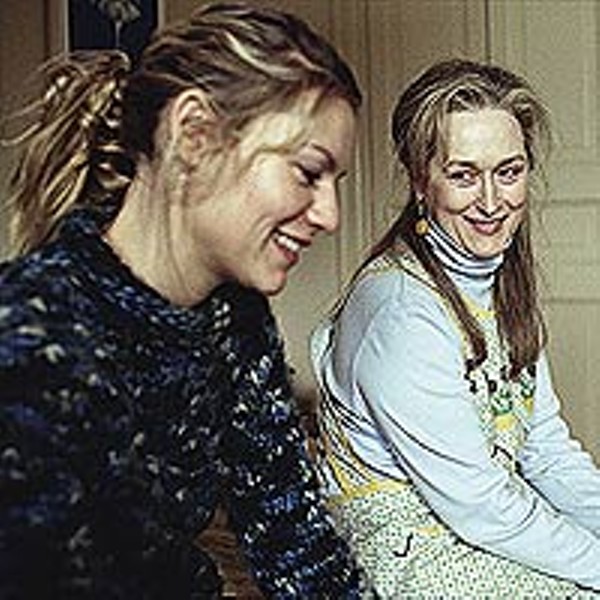In Virginia Woolf's first book, The Voyage Out, a character expresses the desire to write a novel about all the things that people don't say, an ambition that the author herself fulfilled in a later book entitled The Waves. Steadfastly devoted to that interior life and those unspoken thoughts and feelings, inclined to close observation of minute physical detail and subtle shades of emotion, but haunted by the specter of insanity throughout her brilliant career, Woolf drowned herself in 1941. That incident opens The Hours. As the picture shifts back and forth through time and space, Virginia Woolf's life, madness, suicide, and, of course, her art, dominate all the action and character, so that the movie provides something like a "reading" of both that life and that work.
After that opening act, The Hours moves back to the early 1920s, showing the author working on what many critics consider her first major achievement, one of her most famous novels, Mrs. Dalloway. Thereafter, that book dominates the action, characters, and meanings of the film.
Sifting through layers of time, the movie initially situates itself in the London suburb of Richmond, where Woolf (Nicole Kidman) attempts to write and to cope with her precarious mental state. She's assisted by her devoted husband, Leonard (Stephen Dillane), who also runs their small publishing concern, the Hogarth Press. The film then jumps back and forth frequently to other moments and locations. In addition to the setting in 1920s England, it alternates between Los Angeles in 1951 and Manhattan in 2001.
Mrs. Dalloway links the three temporal and spatial settings. A profoundly unhappy young mother in Los Angeles, Laura Brown (Julianne Moore), reads the book and responds to its images of a woman's wrong choices, lost opportunities, failed chances, and vague regrets. Moreover, she also senses the lapping tide of insanity and the seductive undertow of suicide. In Manhattan, an editor, Clarissa Vaughn (Meryl Streep), like Clarissa Dalloway in the novel, prepares an arty party to celebrate the award of a glittering literary prize to her dear friend and quondam lover, Richard (Ed Harris), a poet dying angrily of AIDS.
The three ostensibly disparate narratives occasionally display some specific instances of thematic and personal connection, showing some small, parallel actions and gestures. All three main characters sometimes make analogous or overlapping movements or statements; all three plan one sort of party or another; they gather flowers; they express at least a moment of homosexual passion.
More important, they all confront a terrible and essentially inexplicable emotional crisis in their lives. Virginia quarrels with Leonard about his attempts to maintain her sanity and she rejects the advice of her doctors that she seek a quiet suburban life. Laura Brown --- her name must allude to a famous Woolf essay --- the vaguest and least comprehensible of the three, simply cannot manage her life, her young son, her apparently dull and oppressive marriage. The most vital of the trio, Clarissa simply wants to keep her beloved friend alive a little longer, give him a glimmering of hope, make him at least momentarily happy.
Because the movie cannot reveal the inner thoughts of its subjects in the characteristic Woolf manner, and avoids any hint of a voiceover, the three women must either speak to others of their problems or somehow demonstrate their peculiar desperation by action and expression. The script, unfortunately, seldom allows their interior life to emerge, either in speech or in behavior, with Woolf's clarity and lyricism, as was apparently intended. So Moore, for example, must wander about with a forced smile shining through a mist of unshed tears, uttering odd platitudes, and giving unconvincing reassurances to the sweet little boy who knows she plans to abandon him.
The filmmakers' conception of Woolf herself touches on the comical. Kidman, sporting some sort of putty nose, a determinedly plain face, and a really dedicated dour expression, mopes about in a tatty house dress, annoying the servants, rejecting the compassion of poor Leonard, and very sensitively observing nature up close. In reality, Woolf possessed a sort of aristocratic beauty reminiscent of the Pre-Raphaelites, and in her photographs, she looks more dreamy than angry --- hardly the stern, recalcitrant character that Kidman portrays. The actor seems to think that frowning throughout the movie will convey the pain and lunacy of the artist.
Streep, on the other hand, simply glows with life and feeling, hinting in all sorts of small, utterly naturalistic ways at the real passion and the passionate reality of her character. When she speaks of her love for the dying poet and a small moment of happiness she shared with him, we believe her absolutely. She inspires such compassion for her character that we somehow want her to be happy like that again. She makes her love, her kindness, her terrible pain a hard and comprehensible fact. The performance represents yet another in a long string of triumphs.
Despite its careful cinematography, its distinctive lighting schemes, and its terrific sense of location, The Hours suffers from a fatal fuzziness. Perhaps a movie based on a highly literary book about another highly literary book attains a level of preciousness that works against the usual thrust of cinematic narrative and character development. Streep's remarkable performance raises the film to a level it otherwise would not attain, but the problem of adapting the original material seems to have defeated the efforts of the screenwriter and the director.
The Hours, starring Nicole Kidman, Julianne Moore, Meryl Streep, Stephen Dillane, Miranda Richardson, John C. Reilly, Jack Rovello, Ed Harris, Toni Collette, Allison Janney, Claire Danes, Jeff Daniels; screenplay by David Hare; based upon the novel by Michael Cunningham; directed by Stephen Daldry.
You can hear George and his movie reviews on WXXI-FM 91.5 Fridays at 7:15 a.m., rerun on Saturdays at 11:15 a.m.
